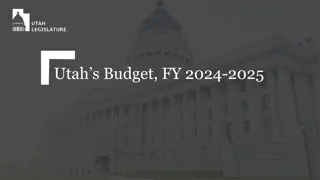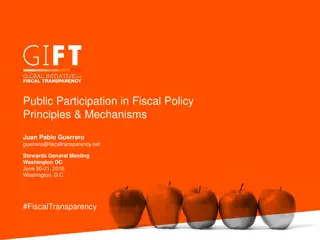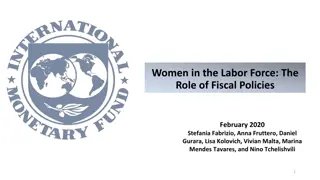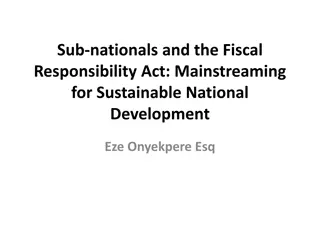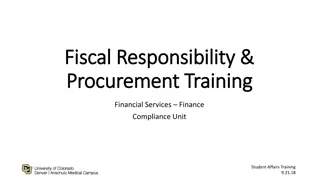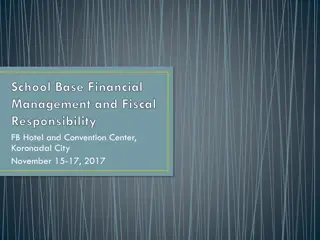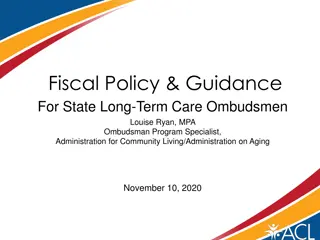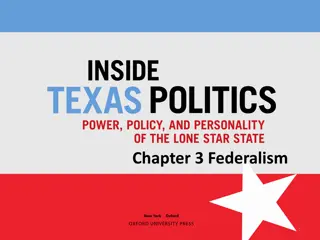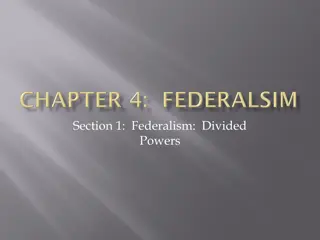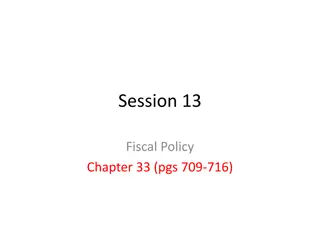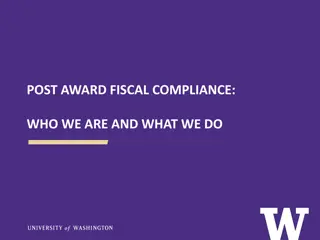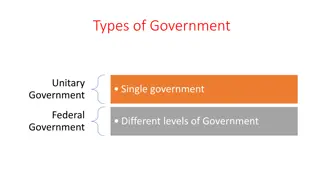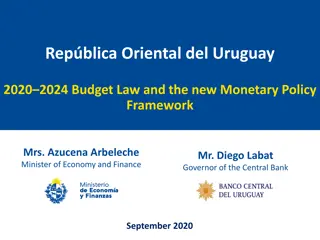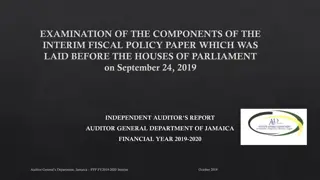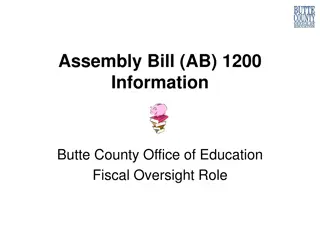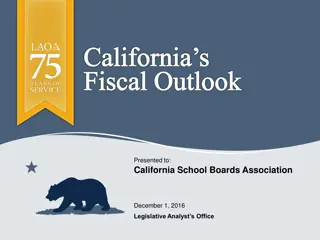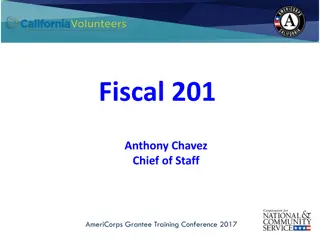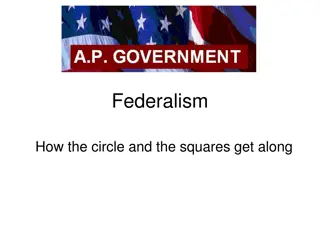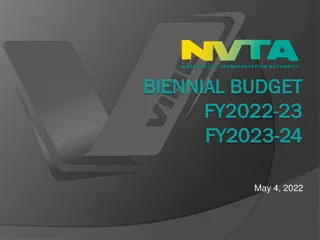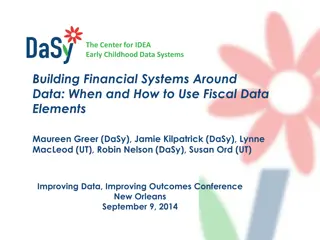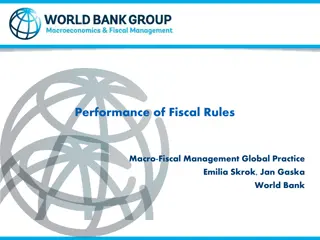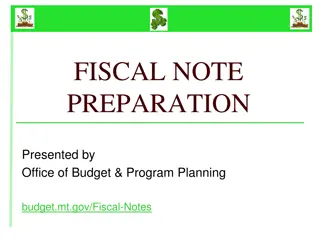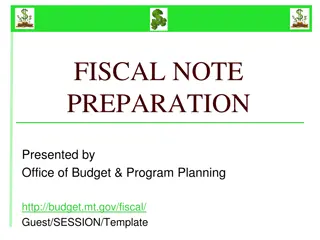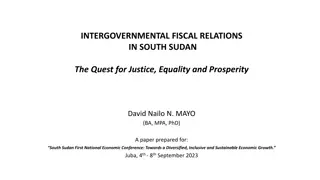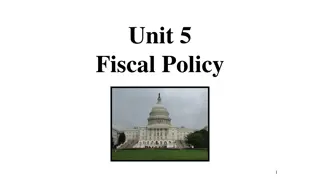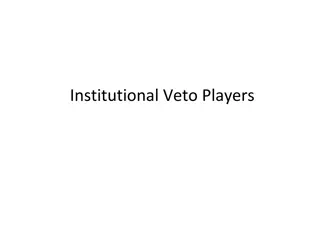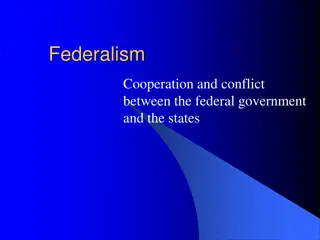Relevance of Countercyclical Fiscal Policy and Fiscal Acyclicality
This literature review examines the effectiveness of countercyclical fiscal policies in stabilizing output and enhancing welfare, with a focus on the correlation between public spending cycles and GDP cycles. The study analyzes examples from Sweden and Argentina to showcase the impact of fiscal poli
2 views • 29 slides
Overview of Utah's Budget for FY 2024-2025
Utah's budget for the fiscal year 2024-2025 is outlined with details on revenue sources, budget priorities, special funding, long-term fiscal health, and budget process changes. The budget allocations cover various sectors including education, transportation, law enforcement, social services, and mo
0 views • 32 slides
Understanding the United States Constitution and Federalism
Delve into the history and significance of the United States Constitution, authored by James Madison in 1787. Explore the debate of ratification, Federalist vs. Anti-Federalist arguments, and the concept of Federalism, with a focus on the balance of powers between the central and state governments.
1 views • 23 slides
Principles of Public Participation in Fiscal Policy
The work by GIFT focuses on developing principles for public participation in fiscal policy, emphasizing the importance of citizen engagement beyond mere disclosure. These principles aim to enhance accountability, uphold citizens' rights, and improve policy quality through inclusiveness and openness
0 views • 17 slides
Gender-Responsive Fiscal Policies and Female Labor Force Participation
Despite persistent gender gaps in labor force participation and wages, various fiscal policy measures have been adopted globally since the mid-1980s to address these disparities. Understanding the impact of gender-responsive fiscal policies on female labor force participation, economic growth, incom
0 views • 23 slides
Fiscal Responsibility Act & Sustainable Development Nexus
Sustainable development integrates environmental health with economic progress. Achieving SDGs requires fiscal responsibility at all levels of governance. Subnational fiscal irresponsibility impacts national growth. It is crucial to manage public resources effectively to attain sustainable developme
0 views • 48 slides
Financial Responsibility and Procurement Training Overview
This overview covers key aspects of financial responsibility, procurement training, and fiscal roles within a university setting. It emphasizes protecting university resources, ensuring compliance with laws and regulations, and upholding ethical standards. It discusses the responsibilities and roles
0 views • 33 slides
Enhancing Fiscal Policy Planning through Public Participation and Transparency
Explore the importance of public participation and meaningful transparency in fiscal policy planning and public expenditure management. Learn about the GIFT Network, its champions and stewards, and how fiscal transparency and public participation can lead to improved fiscal and development outcomes
0 views • 22 slides
School-Based Financial Management and Fiscal Responsibility in Education Governance
School-Based Financial Management and Fiscal Responsibility is crucial for the effective operation of educational institutions. With the implementation of shared governance principles and fiscal autonomy under the School-Based Management System (SBM), schools can efficiently manage their financial r
0 views • 15 slides
Fiscal Policy Guidance for State Long-Term Care Ombudsmen
Overview of the fiscal management responsibilities for State Long-Term Care Ombudsmen under the Older Americans Act requirements. Covers topics such as fiscal management, funding allocations, state plan requirements, and fiscal responsibilities. Details the OAA and LTCOP rule provisions related to f
6 views • 22 slides
Understanding Federalism in the United States
Explore the different types of governmental systems and the distribution of power between the federal and state governments. Learn about the advantages of federalism, how Texas utilizes federal funding, and the evolution of cooperation and coercion within the federal system over time. Dive into conf
7 views • 17 slides
Understanding Federalism: Divided Powers and Constitutional Framework
Federalism is a system where powers are divided between a central government and regional entities. It involves delegated, reserved, exclusive, and concurrent powers outlined in the Constitution. The supremacy of the Constitution is pivotal in establishing a unified federal government.
0 views • 5 slides
Understanding Fiscal Policy: A Comprehensive Overview
Fiscal policy involves changes in government spending and taxes to influence macroeconomic objectives like employment, price stability, and economic growth. It includes expansionary and contractionary policies to manage aggregate demand and stabilize the economy. This overview covers types of fiscal
0 views • 24 slides
Federalism and Election Administration in 2022
Explore the intersection of federalism and election administration in the 2022 U.S. elections, focusing on challenges such as election denialism, security measures, and the roles of state and federal officials. Learn about the key concepts of election oversight, the impact of electoral processes at
0 views • 7 slides
Principles of Fiscal Deficits and Debt Management According to Kalecki
Economist Kalecki advocated for a permanent regime of fiscal deficits to manage public debt, emphasizing the importance of debt management for liquidity in the financial system. His principles involve splitting the government budget into functional and financial parts, each influencing aggregate dem
0 views • 6 slides
Post Award Fiscal Compliance: Who We Are and What We Do
Post Award Fiscal Compliance (PAFC) assists campus and central administrative units in mitigating non-compliance risks with sponsor terms and conditions by monitoring compliance, interpreting award requirements, providing training, and enhancing internal controls. The team includes Matt Gardner, Ass
0 views • 11 slides
Understanding Fiscal Federalism and Decentralization in Government Systems
Fiscal federalism involves the allocation of responsibilities and resources between central and local governments, addressing key issues such as regulation, incentives for resource transfer, and financial balance. Fiscal decentralization, on the other hand, focuses on transferring taxing and spendin
0 views • 16 slides
State Re-structuring and Federalism in Nepal by Resham Kandel
State restructuring in Nepal involves the redistribution of power across different tiers of government and the redesign of governance structures to achieve political, economic, social, and administrative transformation. The concept focuses on decentralization, inclusivity, and proportional represent
0 views • 26 slides
Year-End Closing Checklist for School Fiscal Services
Review key areas such as tax revenue, grants, grant revenue, lease rental fund revenue, accruals, deferred outflow, liabilities, and deferred inflow to properly prepare for the year-end closing in school fiscal services. Ensure accuracy in financial records and compliance with regulations for a smoo
0 views • 21 slides
Economic Recovery and Fiscal Stability in Uruguay: Budget Law and Monetary Policy Framework 2020-2024
The Budget Law and Monetary Policy Framework in Uruguay for 2020-2024 focus on restoring fiscal consolidation, stabilizing debt, and implementing market-friendly policies for economic recovery. Successful COVID-19 containment strategies have allowed for a faster normalization of economic activity. L
2 views • 35 slides
Understanding Federalism in the United States
Federalism in the United States involves the relationship between the federal government and state governments, with terms such as delegated powers, reserved powers, concurrent powers, and the Elastic Clause playing key roles. The aftermath of events like Hurricane Katrina and policies such as No Ch
0 views • 30 slides
Examination of Interim Fiscal Policy Paper for Financial Year 2019-2020
An independent auditor's report on the interim fiscal policy paper laid before the Houses of Parliament, confirming compliance with the requirements of the FAA Act. The report assesses the components, conventions, and assumptions underlying the paper for fiscal responsibility, macroeconomic framewor
1 views • 15 slides
Challenges and Impacts of the Pandemic on Intergovernmental Cooperation
The pandemic has led to severe economic repercussions for state and local governments, with significant revenue losses and job cuts. The CARES Act provided some relief, but issues like distribution challenges and documentation worries persist. The need for fiscal federalism is highlighted amid decli
3 views • 10 slides
Butte County Office of Education Fiscal Oversight Role Overview
The Assembly Bill (AB) 1200 provides insights into the fiscal oversight role of Butte County Office of Education (BCOE). It outlines the responsibilities of local boards of education, BCOE as an intermediary agent, and the creation of the Financial Crises and Management Assistance Team (FCMAT) in 19
0 views • 12 slides
California's Fiscal Outlook Presentation to California School Boards Association
California's fiscal outlook was presented to the California School Boards Association by the Legislative Analyst's Office in December 2016. The report highlights a decrease in revenues and expenditures for the 2016-17 fiscal year, leading to a revised reserve down by $1 billion. However, the state i
0 views • 22 slides
AmeriCorps California Volunteers Fiscal Training Conference 2017 Details
In July 2017, the AmeriCorps Grantee Training Conference took place, focusing on fiscal procedures, compliance, desk reviews, and monitoring. The conference covered topics such as improper payments elimination, common audit findings, and the fiscal desk review process implemented by California Volun
2 views • 22 slides
Understanding Federalism: Powers, Relationships, and Key Terms
Explore the concept of Federalism through the relationship between the federal government (circle) and state governments (squares). Discover the powers involved such as Delegated, Reserved, Concurrent, and Prohibited powers. Delve into significant cases like McCulloch v. Maryland, terms like the Ela
0 views • 28 slides
Fiscal Year 2023 Budget Overview
The content presents detailed information on the fiscal year 2023 budget, including budget cycles, comparisons between fiscal years, source of funds, expenditure plans, and top projects for the Consolidated Municipal Agency (CMA). It covers budget development processes, funding sources, expenditure
0 views • 11 slides
Emerging Markets Investors Alliance and GIFT: Promoting Fiscal Transparency
The Emerging Markets Investors Alliance, in partnership with GIFT (Global Initiative for Fiscal Transparency), aims to educate institutional investors about fiscal transparency and facilitate investor advocacy with governments. Through roundtable discussions and engagements with finance ministers, t
0 views • 5 slides
Understanding Fiscal Reports and Budgeting Process
Dive into the world of fiscal reports and budgeting with a presentation led by Stephanie Dirks. Explore the Budget Code Story, different types of reports, and examples of Fiscal 04 & Fiscal 06 reports. Learn about Fund allocations, Object Codes, and responsible oversight of funds. Get insights into
0 views • 17 slides
Building Financial Systems Around Fiscal Data in Early Childhood Programs
Understand the importance of fiscal data in program management, identify key fiscal data elements, address policy questions, and learn from a state's cost study design. Explore the significance of fiscal data for decision-making, policy development, and program management, with a focus on revenue so
0 views • 31 slides
Global Practices in Fiscal Rule Performance
The study explores the implementation and impact of fiscal rules on macro-fiscal management, focusing on international experiences. It discusses the presence and compliance with fiscal rules, highlighting differences in pro-cyclicality among small and large countries. The rise in adoption of nationa
0 views • 23 slides
Understanding Fiscal Notes in Government Legislation
Fiscal notes are essential documents accompanying bills affecting finances of state entities. They detail revenue, expenditure, and fiscal impact, requiring a 6-day processing timeline. The need for a fiscal note may be determined by legislative services, committees, sponsors, or agencies. The proce
1 views • 30 slides
Fiscal Note Preparation Process and Guidelines
Fiscal notes are essential for bills affecting state finances. This includes the total processing time, exceptions, and what to do if there is disagreement on the fiscal note. The process involves multiple steps, including drafting, review, and resolution of disagreements. The President of the Senat
0 views • 29 slides
Intergovernmental Fiscal Relations in South Sudan: A Quest for Justice, Equality, and Prosperity
This paper explores intergovernmental fiscal relations in South Sudan, focusing on decentralization, taxation, spending, grants, equalization, and transfers to oil-producing states. It discusses the importance of fiscal federalism, the evolution of decentralization in Sudan, and the country's depend
0 views • 21 slides
Understanding Government Tools for Economic Stability
The government uses fiscal and monetary policies to stabilize the economy. Fiscal policy involves Congress's actions through government spending or taxation changes, while monetary policy is driven by the Federal Reserve Bank. Discretionary fiscal policy involves new bills designed to adjust aggrega
0 views • 36 slides
Understanding Federalism and Devolution in Government Structures
Federalism encompasses the division of sovereignty between territorial levels, while devolution grants powers to subnational governments with the right to recall them. This approach is evident in countries like India. The structural components of federalism involve geopolitical division, independenc
0 views • 64 slides
Understanding Federalism in the US Constitution
Forest Gump showcases the conflict between state and federal powers, exemplified by Governor George Wallace's refusal to desegregate the University of Alabama. The scenario underscores the concept of federalism, which isn't explicitly stated in the Constitution but is evident in the division of powe
0 views • 18 slides
Understanding Federalism: Cooperation and Conflict Between Governments
Federalism entails the division and sharing of powers between national and state governments, aiming for cooperative problem-solving. James Madison highlighted the need for checks and balances to control government abuse. The Constitution delegates specific powers to the national government while al
0 views • 9 slides
Political Cleavages in Post-Colonial Societies: Social-Nativism vs. Social-Federalism
This lecture explores the shifting political cleavages in post-colonial societies, focusing on the rise of social-nativism and social-federalism. It examines the reversal of the education cleavage in Western democracies, the emergence of social-nativism in post-communist Eastern Europe, and the chan
0 views • 30 slides

